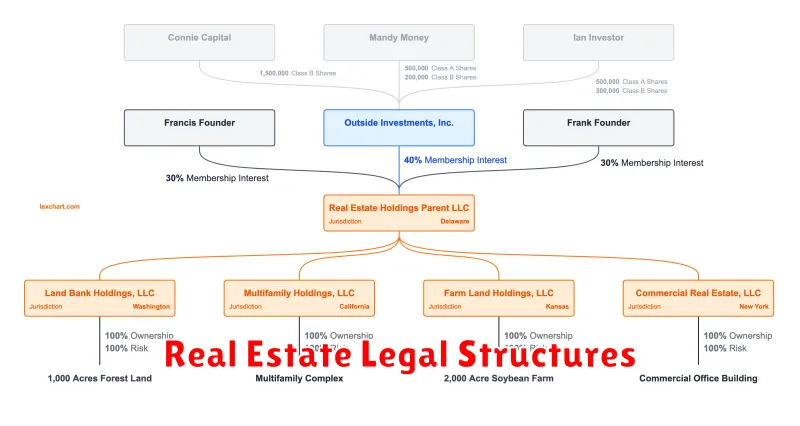Starting a real estate venture is an exciting step, but it’s crucial to have the right foundation. Choosing the right legal structure is one of the most important decisions you’ll make. It impacts your liability, taxes, and overall business structure. This decision shouldn’t be taken lightly.
Whether you’re flipping houses, developing properties, or managing rental units, understanding the legal implications of different structures is essential. From the simplicity of a sole proprietorship to the complexity of a corporation, this guide will explore the key legal structures for real estate ventures and help you determine which one best aligns with your goals.
Understanding Different Legal Structures
Choosing the right legal structure for your real estate ventures is crucial for success and is one of the first steps you should consider. The legal structure determines how your business is organized, managed, and taxed. It also impacts your personal liability, which is the extent to which you are personally responsible for the debts and obligations of your business. Understanding different legal structures is essential for making an informed decision.
Here are some of the most common legal structures for real estate ventures:
Sole Proprietorship
A sole proprietorship is the simplest form of business ownership, where the business is owned and run by one person. There is no legal distinction between the owner and the business, which means the owner is personally liable for all business debts and obligations. This structure is easy to set up and requires minimal paperwork, making it attractive for small, individual ventures. However, the lack of legal separation between the owner and the business can expose the owner to significant personal financial risk.
Partnership
A partnership is formed when two or more individuals agree to share in the profits and losses of a business. There are two main types of partnerships: general partnerships and limited partnerships. In a general partnership, all partners have unlimited liability for business debts. In a limited partnership, there are general partners with unlimited liability and limited partners with limited liability, typically only contributing financially. Partnerships can be a good option for businesses with multiple owners who want to share in the decision-making process and the profits. However, it is important to have a well-drafted partnership agreement to outline the responsibilities and liabilities of each partner.
Limited Liability Company (LLC)
An LLC is a hybrid business structure that offers the limited liability of a corporation with the pass-through taxation of a partnership. This means that the owners of an LLC are not personally liable for business debts and obligations, and the business income is taxed at the individual level. LLCs provide flexibility in terms of ownership structure and management. This structure is particularly beneficial for real estate ventures as it provides limited liability protection while allowing for pass-through taxation.
Corporation
A corporation is a separate legal entity from its owners, known as shareholders. Corporations offer the highest level of liability protection, meaning that shareholders are not personally liable for business debts. They also have the potential for raising capital through the issuance of stock. Corporations are subject to double taxation, meaning that the corporation’s profits are taxed at the corporate level and then again when distributed to shareholders as dividends. Corporations can be complex to set up and maintain, but they offer significant benefits in terms of liability protection and fundraising opportunities.
The best legal structure for your real estate venture depends on your specific circumstances, including the size and scope of your business, your personal financial situation, and your future goals. It’s essential to consult with a legal professional to determine the best structure for your business.
Sole Proprietorship: Simplicity vs. Liability
A sole proprietorship is the simplest form of business structure, making it a popular choice for many real estate ventures. It requires minimal paperwork and setup, allowing you to quickly get your business up and running. As the sole owner, you have complete control over all aspects of your business, including profits and decisions.
However, this simplicity comes with a tradeoff: unlimited personal liability. This means that your personal assets, such as your home, car, and savings, are at risk if your business incurs debt or faces lawsuits. Any legal actions against your business will also directly affect your personal finances. This can be a significant deterrent, especially for high-risk real estate ventures.
For some real estate investors, the ease of setup and control outweighs the risk of liability. However, it’s crucial to carefully weigh your options and consult with legal counsel before deciding whether a sole proprietorship is the right fit for your specific needs and circumstances.
Partnership: Sharing Responsibilities and Risks
A partnership is a popular legal structure for real estate ventures, allowing two or more individuals to pool resources and expertise. While this can be advantageous, it’s crucial to understand the responsibilities and risks involved.
In a partnership, each partner contributes to the venture and shares in the profits and losses. This creates a strong incentive to work together and achieve shared goals. However, it also means that each partner is personally liable for the debts and obligations of the partnership. This can be a significant risk, particularly if one partner is unable to fulfill their financial obligations.
Partners must carefully consider how they will divide responsibilities and decision-making. A well-defined partnership agreement is essential to outline each partner’s roles, contributions, and rights. This helps to prevent disputes and ensure a smooth operation.
Overall, a partnership can be an effective legal structure for real estate ventures, but it’s important to weigh the potential benefits against the risks. Carefully consider the responsibilities and liabilities involved, and ensure you have a strong partnership agreement in place.
Limited Liability Company (LLC): Balancing Flexibility and Protection
A Limited Liability Company (LLC) offers a compelling blend of flexibility and protection for real estate ventures. It acts as a separate legal entity, shielding your personal assets from business liabilities. This means that if your LLC faces financial difficulties or lawsuits, your personal property, like your home or savings, remains protected.
One of the significant advantages of an LLC is its operational flexibility. You can choose to structure it as a single-member LLC, where you are the sole owner, or as a multi-member LLC, with multiple owners. The ownership structure and decision-making processes can be tailored to your specific needs.
Furthermore, LLCs provide tax benefits. In most cases, they operate as a “pass-through” entity, meaning that profits and losses are passed through to the owners’ personal income taxes. This can simplify your tax filings and potentially lead to lower tax liabilities.
While the LLC offers numerous advantages, it’s essential to understand that it may involve additional administrative requirements compared to a sole proprietorship. You’ll need to file articles of organization with the state, maintain a separate bank account, and adhere to specific legal formalities.
S Corporation and C Corporation: Considerations for Larger Investments
As your real estate ventures grow and you start attracting larger investments, the choice between an S Corporation and a C Corporation becomes increasingly crucial. Both offer distinct advantages and disadvantages, and the best fit depends on your specific circumstances and long-term goals.
An S Corporation allows profits and losses to pass through directly to the owners’ personal income taxes, avoiding the double taxation that C Corporations face. This can be a significant benefit for smaller businesses and those seeking tax efficiency. However, S Corporations are subject to strict ownership limitations, typically requiring at least 75% of shareholders to be U.S. citizens or permanent residents.
A C Corporation, on the other hand, is treated as a separate legal entity from its owners. While this means the corporation pays taxes on its profits separately, it also offers greater flexibility in terms of ownership and fundraising. C Corporations are often favored by larger, more established companies seeking access to capital markets or seeking to attract investors from outside the U.S.
For larger real estate ventures, several factors come into play when considering S vs. C Corporation:
- Funding: If you plan to raise significant capital from outside investors, a C Corporation offers greater flexibility in terms of ownership structure and potential for future IPOs or private equity investments.
- Tax Implications: While C Corporations face double taxation, they may offer potential advantages in terms of deductions and tax planning strategies, especially for larger, more complex businesses.
- Liability Protection: Both S and C Corporations offer limited liability protection, shielding your personal assets from business liabilities. This is crucial for managing risk in real estate ventures.
Ultimately, the choice between an S Corporation and a C Corporation for larger investments requires careful consideration. Consult with legal and financial professionals to determine the structure that best aligns with your financial goals, investment strategy, and long-term vision for your real estate ventures.
Real Estate Investment Trusts (REITs): Passive Investment Options
For investors seeking a passive way to invest in real estate, Real Estate Investment Trusts (REITs) offer an attractive option. REITs are companies that own and operate income-producing real estate, such as office buildings, shopping malls, apartments, and data centers. They pool capital from multiple investors and distribute a portion of their profits to shareholders in the form of dividends.
REITs provide investors with several benefits, including:
- Diversification: REITs allow investors to diversify their portfolios by investing in a range of real estate properties across different sectors and locations.
- Professional Management: REITs are managed by experienced professionals who handle all aspects of property ownership, from acquisition and maintenance to tenant management and leasing.
- Liquidity: REITs are publicly traded on stock exchanges, providing investors with the ability to easily buy and sell shares.
- High Dividend Yields: REITs are required to distribute at least 90% of their taxable income to shareholders, resulting in potentially high dividend yields.
There are two main types of REITs: equity REITs and mortgage REITs. Equity REITs own and operate real estate properties, while mortgage REITs invest in real estate mortgages. Investors can choose the type of REIT that best aligns with their investment goals and risk tolerance.
Investing in REITs can be a valuable addition to a well-diversified investment portfolio. However, it’s important to conduct thorough research and consider factors such as the REIT’s management team, property portfolio, and dividend history before making an investment decision.
Choosing the Optimal Structure for Your Investment Goals
The legal structure you choose for your real estate ventures directly impacts your financial obligations, liability exposure, and tax implications. While various structures exist, selecting the optimal one hinges on your unique investment goals and objectives. For example, if your primary goal is to minimize personal liability, forming an LLC or corporation might be prudent. Conversely, if maximizing tax benefits is paramount, considering a REIT or partnership could be advantageous.
Here are key considerations when aligning your legal structure with your investment goals:
- Personal Liability: An LLC or corporation offers limited liability protection, shielding your personal assets from business debts and lawsuits. This is crucial for investors seeking to safeguard their personal wealth.
- Tax Benefits: Certain structures, such as REITs, provide specific tax advantages, including pass-through income and reduced capital gains taxes. Understanding the tax implications of each structure is vital for optimizing your investment returns.
- Fundraising: Corporations and REITs facilitate easier fundraising through the issuance of stocks or bonds. This can be beneficial for large-scale projects requiring substantial capital.
- Management and Control: Sole proprietorships offer complete control, while partnerships require shared decision-making. Choosing a structure that aligns with your desired level of control and management is crucial.
- Administrative Burden: Certain structures, such as corporations, involve more administrative compliance and reporting requirements compared to sole proprietorships or partnerships. Evaluating the administrative burden associated with each structure is essential.
By meticulously assessing your investment goals, risk tolerance, and long-term vision, you can determine the legal structure that best aligns with your objectives and safeguards your financial future. Consulting with a qualified legal and financial advisor can provide invaluable insights and guidance in choosing the most suitable structure for your real estate ventures.
Tax Implications of Different Legal Structures
When venturing into real estate, choosing the right legal structure is crucial, as it significantly impacts your tax liabilities. The three most common structures for real estate ventures are sole proprietorships, partnerships, and corporations, each carrying its own unique tax implications.
Sole Proprietorship: This simplest structure directly ties the business owner’s personal income and expenses to the business. This means all profits are taxed at the owner’s individual income tax rate, while losses are deductible against other personal income. However, the owner is personally liable for all business debts and obligations.
Partnership: This structure involves two or more individuals pooling resources to run a business. Partners share profits and losses according to their partnership agreement. Tax implications are passed through to each partner’s individual tax return. Similar to sole proprietorships, partners are personally liable for business debts.
Corporations: This structure offers legal separation between the business and its owners (shareholders). Corporations pay corporate income tax on their profits. Profits distributed to shareholders are subject to individual income tax rates. This structure offers limited liability, shielding shareholders from personal liability for business debts. However, corporations are subject to double taxation on profits: once at the corporate level and again when distributed to shareholders.
The choice of legal structure ultimately depends on individual circumstances and goals. It’s wise to consult with a tax professional to understand the implications of each structure for your specific situation. Factors to consider include anticipated profit, potential liability risks, and long-term goals.
Liability Protection and Asset Shielding
Choosing the right legal structure for your real estate ventures is crucial for protecting your personal assets and mitigating financial risk. Different legal structures offer varying levels of liability protection and asset shielding.
A sole proprietorship, for instance, provides no separate legal entity, meaning your personal assets are directly at risk if your business faces legal action. In contrast, a limited liability company (LLC) creates a separate legal entity, shielding your personal assets from business debts and lawsuits.
Similarly, a corporation offers strong liability protection, but comes with additional regulatory requirements. Choosing a structure that effectively separates your personal assets from business liabilities is vital, especially in high-risk real estate ventures.
For example, if a tenant sues your business due to an accident on your property, an LLC or corporation structure would likely prevent the lawsuit from reaching your personal assets. Without this protection, your home, savings, and other personal property could be at risk.
Ultimately, the best legal structure for your real estate ventures depends on your specific circumstances, risk tolerance, and financial goals. Consulting with a legal professional or accountant can help you navigate these complexities and choose the structure that offers the right balance of liability protection and asset shielding for your unique situation.
Factors to Consider When Consulting with an Attorney

Choosing the right legal structure for your real estate ventures is a crucial decision that can impact your liability, taxes, and overall success. Consulting with an experienced real estate attorney is highly recommended to ensure you make the best choice for your specific circumstances. Here are some key factors to consider when consulting with an attorney:
Experience and Expertise: Look for an attorney with proven experience in real estate law and a strong understanding of the different legal structures available. They should be familiar with the nuances of each structure and its potential advantages and disadvantages.
Communication and Transparency: Effective communication is essential. Choose an attorney who is responsive, clearly explains legal concepts, and keeps you informed throughout the process. They should be willing to answer your questions and address your concerns openly and honestly.
Understanding Your Goals: Before your consultation, take the time to clearly define your objectives for your real estate ventures. What are your short-term and long-term goals? How much risk are you willing to take? What are your tax considerations? By clearly articulating your goals, you can ensure the attorney understands your needs and provides tailored advice.
Fee Structure: Discuss the attorney’s fee structure upfront. This includes their hourly rate, retainer agreements, and any other applicable fees. Understand how the fees are calculated and what services they cover. Transparency and clarity in fees are vital.
State-Specific Regulations and Requirements

The legal structure you choose for your real estate venture will have significant implications for your business operations, liability exposure, and tax obligations. Beyond the general factors discussed previously, it’s crucial to understand the state-specific regulations and requirements that apply to your chosen legal structure. Each state has its own unique set of laws governing business formation, taxation, and liability.
For example, some states may have specific requirements for the formation of LLCs, such as the need for a registered agent or the filing of certain documents with the Secretary of State. Additionally, states may have different tax rates and regulations for different types of businesses. It’s essential to consult with an attorney or accountant familiar with your state’s laws to ensure compliance and optimize your business structure.
Some key considerations include:
- Registration requirements: This involves filing articles of incorporation or articles of organization with the state. Specific forms and fees may vary depending on the state and type of entity.
- Licensing and permits: Depending on the nature of your real estate venture, you may need specific licenses and permits to operate. Examples include real estate licenses, contractor licenses, and zoning permits.
- Taxation: States have different tax structures, including corporate income tax, franchise tax, and sales tax. You should consult with a tax advisor to understand the specific tax implications of your chosen legal structure.
- Liability exposure: The level of liability you face as a business owner varies depending on the legal structure. For instance, sole proprietorships offer limited liability protection, while corporations provide greater protection from personal liability.

